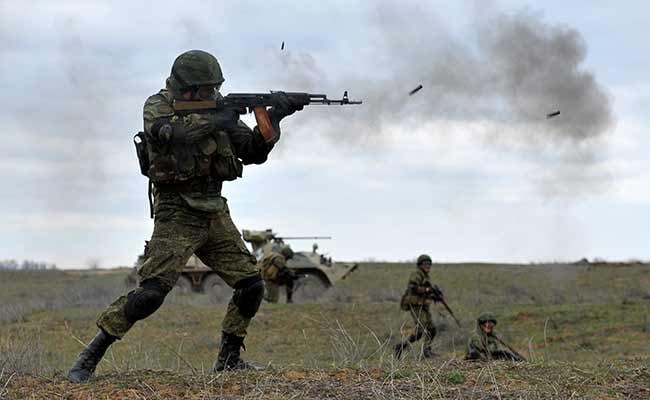
Mammoth Russian military drills ordered by President Vladimir Putin from the Pacific to the Black Sea are designed to send a message to the West: keep your distance and don't overplay your hand on Ukraine, observers say.
Since the start of the Ukraine crisis more than a year ago, Russia has flexed its muscles with a series of war games but the scale of the latest military exercises -- including sending nuclear bombers to Crimea and ballistic missiles to Kaliningrad in central Europe -- has triggered a series of new questions.
Experts say whatever the purpose of the latest manoeuvres involving tens of thousands of troops, the intent is clear: to show Putin's Russia will stop at nothing to protect its interests.
Brinkmanship diplomacy
Military analyst Pavel Felgenhauer said Russia was pursuing a two-pronged strategy: using "nuclear blackmail" to try to press the West into making concessions amid sanctions over Ukraine while making sure its forces are ready for any full-scale military confrontation.
"This is brinkmanship, balancing on the brink of war," he told AFP, adding that in the current atmosphere of shattered ties with the West the Kremlin is not ruling out any scenarios.
"These are preparations for a possible nuclear conflict, for a big war with Europe and for a global nuclear war with America."
In a bombastic statement many saw as emblematic of the Kremlin's willingness to go all out, Putin said he was ready to put Russia's nuclear forces on alert during the annexation of Crimea a year ago.
But others dismissed it as little more than posturing.
"Putin is talking about nuclear weapons but no one is afraid of us," wrote Yulia Latynina, a columnist for Novaya Gazeta newspaper. She called the "grandiose bluff" a warning to the West not to escalate the Ukraine crisis.
The tactics have worked to a degree. Washington is sending troops on a training mission to Ukraine next month but is holding off on supplying Kiev with lethal weaponry.
Russia's seizure of Crimea, support for Ukranian separatists and drills across Russia have caused unease in Eastern Europe and galvanised NATO, which is boosting defences on Europe's eastern flank.
This month European Commission chief Jean-Claude Juncker went so far as to call for the creation of an EU army. Russia insists the only purpose of its drills is to keep its armed forces battle ready.
"This is neither the rumbling of caterpillar tracks, nor sabre rattling nor muscle flexing," said deputy defence minister Anatoly Antonov.
"We are not like some countries who cockily stage a show of force by moving their troops, arms and equipment to foreign territories."
He said foreign attaches would be briefed on the drills at the military's top secret National Defence Management Centre this weekend.
The country-wide exercises have involved nearly every unit: from paratroopers to antisubmarine and air forces and from special operation units to communications personnel.
The Northern Fleet has been put on full combat alert and on Friday Russia launched military exercises on the Kuril Islands, a chain of Pacific islands claimed by Japan. Moscow is also sending nuclear capable Iskander missiles to the exclave Kaliningrad region bordering EU members Poland and Lithuania.
Lithuanian President Dalia Grybauskaite slammed the deployment, saying the missiles "can reach nearly half of European capitals, it can reach Berlin."
Damn, that was impressive
But US commanders have professed grudging admiration for Russia's ability to move troops quickly.
"I've been watching the Russian exercises ... what I cared about is they can get 30,000 people and 1,000 tanks in a place really fast," Lieutenant General Ben Hodges, the US Army's most senior commander in Europe, told reporters.
Damn, that was impressive
Putin has made reviving the army one of the top priorities of his 15-year rule.
After years of post-Soviet neglect, the armed forces received new aircraft, tanks and missiles; opened new bases in the Arctic and resumed Cold War-style strategic bomber patrols.
Many analysts say Russia cannot afford an overt invasion of Ukraine or a broader conflict with Europe amid the economic crisis and the threat of more Western sanctions. But Yevgeny Buzhinsky, a senior military analyst at the PIR Centre, said nothing could be ruled out.
"It is impossible to look at war from the point of view of a business plan, especially in Russia," said Buzhinsky, who retired from the armed forces in 2009 with the rank of lieutenant general.
Russia has a long history of mobilising its resources for war, he said.
"The Russians are no strangers to mobilisation, historically and genetically."
Track Latest News Live on NDTV.com and get news updates from India and around the world

